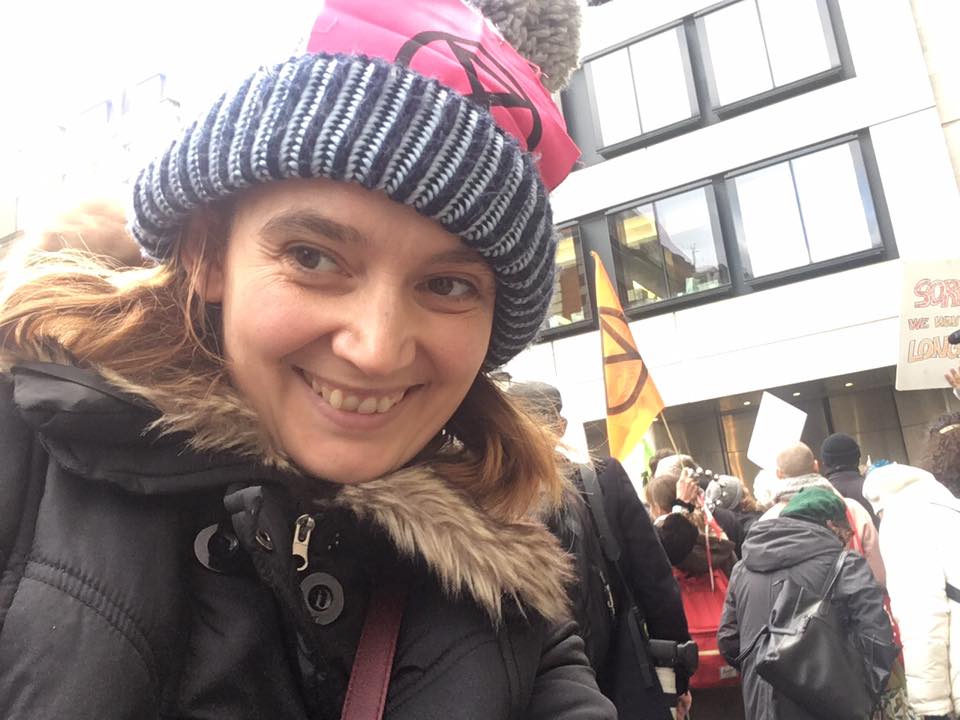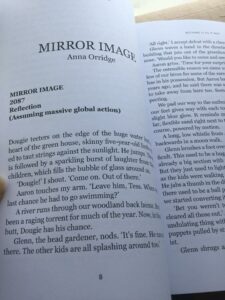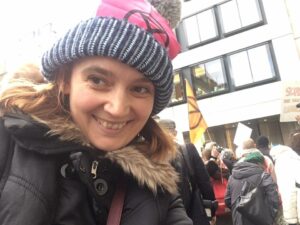
JULIA LEE BARCLAY-MORTON – YOGA, WATER AND REWRITING AUTISM
I interviewed writer Julia Lee Barclay-Morton about her experience of autism. Julia began as an experimental dramatist in New York, moving to the UK to


Author Anna Orridge writes cli-fi as well as eco and nature-influenced stories, novels and poems. I asked Anna about the psychological impact of writing about these difficult but important subjects and her own personal creative methods.
Leslie: What are the various ways you write about climate change?
Anna: The short stories I write which have a climate focus are usually set in the near future. ‘Vane’, for example, which appeared in Mslexia, is set in an anonymous British coastal village about fifty years from now. The cli fi novel I’m currently writing takes place in York in 2054. I try to show how people go about their everyday lives in spite of the inevitable upheavals that climate change brings. I also focus on setting to a great extent, as it helps the reader to ground themselves in what will be a drastically altered everyday reality. For my eco-poetry, which I usually post on Twitter, I often focus on the emotional fall-out of the losses we are experiencing: the grief and the anxiety. I suppose it’s a form of therapy for me, a way of working through my own sense of helplessness. Ecology and nature also seep their way into the stories I write which don’t have a climate focus. We are, of course, living with climate change now, although some feel its effects to a far greater extent than others. It’s impossible to escape.
Leslie: How do you manage to turn dry facts into imaginative experience?
Anna: Climate change is so huge and overwhelming a phenomenon, I think that focusing on how it affects one particular place, or one aspect of life, helps the reader to digest it. ‘Vane’, for example, zeroes in on how rapid resource depletion and the destabilization of weather systems could affect the progressive values that have been painfully fought for and won in the last hundred years, especially those for LGBTQIA people. And ‘Succinction’, a piece of flash fiction published in Wild Voices: An Anthology of Wildlife Issues this year, focuses on the future effects of climate change on a small bird sanctuary and the ornithologist tasked with caring for it.
Leslie: What are the kind of incidents or anecdotes that typically inspire you to write?
 Anna: It’s often very mundane occurrences that provide the trigger. I was in a soft play centre with my toddler daughter when inspiration for my short story ‘Mirror Image’ hit me. (The story appears in the Retreat West anthology Nothing Is As It Was.) I was thinking about how so much of what we regard as the typical experience of childhood now focuses around activities that are extremely carbon-intensive. It also led me to reflect on the sheer inter-generational injustice of climate change. The story is, in fact, set in an old soft-play centre. The first half of the story supposes a societal trajectory of massive emission cuts and climate action, and imagines the centre as a repurposed greenhouse and community centre. The second half imagines the centre abandoned as civilisation breaks down completely, riven by lawlessness and starvation. Unfortunately, I think we are, at present, leaning more towards the second scenario than the first. But I believe it is the duty of cli-fi writers to bring the entire range of possibilities to life. I think there is still plenty to fight for.
Anna: It’s often very mundane occurrences that provide the trigger. I was in a soft play centre with my toddler daughter when inspiration for my short story ‘Mirror Image’ hit me. (The story appears in the Retreat West anthology Nothing Is As It Was.) I was thinking about how so much of what we regard as the typical experience of childhood now focuses around activities that are extremely carbon-intensive. It also led me to reflect on the sheer inter-generational injustice of climate change. The story is, in fact, set in an old soft-play centre. The first half of the story supposes a societal trajectory of massive emission cuts and climate action, and imagines the centre as a repurposed greenhouse and community centre. The second half imagines the centre abandoned as civilisation breaks down completely, riven by lawlessness and starvation. Unfortunately, I think we are, at present, leaning more towards the second scenario than the first. But I believe it is the duty of cli-fi writers to bring the entire range of possibilities to life. I think there is still plenty to fight for.
Leslie: What helps and hinders you from writing? What are your compositional methods?
Anna: I’m not terribly keen on complete silence. I like to be in a mildly buzzing environment, like a cafe or bus. Coffee helps. And my crazy writers’ support group, TWP, helps even more, both with boosting sagging morale and offering critiques. With short stories, I just take the kernel of an idea or an image and see where it takes me, usually with just a notepad and a pen. With novels, however, I find I need to do a fairly extensive plan after a couple of chapters. I like to have a couple of beta readers, but no more than that.
Leslie: To what extent is your dystopian writing a product of the times we live in? Or is it more of an extension of your own temperament?

Anna: It’s definitely not an extension of my temperament. I am, in fact, naturally cheerful and optimistic. So, yes, I think it’s certainly a product of the times we live in, both the deeply worrying political currents and the apathy and nihilism that seems to cloud the lives of so many people.
Leslie: Who are your favourite contemporary writers? Why them?
Anna: I really, really want to say Ursula K. LeGuin, although I suppose I shouldn’t, because she very sadly died last year. More than any other writer, she showed me the sheer emotional scope that sci-fi can encompass, and made me think deeply about the complexities of gender and politics. I wrote a little poem in her honour just after her death:
The compassion of your work first drew me in. I don’t mean that guilt-tinged concern that often passes for compassion. But a thirst to make us truly feel – for people, yes, but for dragons too. And the fires within us that those dragons represent.
There are many contemporary writers I admire, but I would like to particularly mention Barbara Kingsolver, Gregory Norminton and David Mitchell, for their sensitive handling of the ecological emergency and the uncertainty of our collective future, as well as the lessons we may be able to glean from the past.
Leslie: Why do you write?
 Anna: I enjoy all forms of art. I suppose novels, short stories and poetry, though, have always drawn the most profound emotional and intellectual response from me. And I want to be able to emulate that. You know that famous Venn diagram of ‘Your Purpose in Life’? The one with four circles: That Which You’re Good At, That Which The World Needs, That Which The World Needs and That Which You Can Be Paid for? Well, I suppose writing is that little sweet spot where all those circles converge for me. (Although I need to work on the ‘Paid for’ bit…)
Anna: I enjoy all forms of art. I suppose novels, short stories and poetry, though, have always drawn the most profound emotional and intellectual response from me. And I want to be able to emulate that. You know that famous Venn diagram of ‘Your Purpose in Life’? The one with four circles: That Which You’re Good At, That Which The World Needs, That Which The World Needs and That Which You Can Be Paid for? Well, I suppose writing is that little sweet spot where all those circles converge for me. (Although I need to work on the ‘Paid for’ bit…)
You can read Anna’s story ‘Backdrop’ that appeared in The Mechanics’ Institute here
Next week I interview artist Carla Winterbottom, whose visionary work has a deep connection with climate change and extinction.
ABOUT LESLIE TATE’S BOOKS:

I interviewed writer Julia Lee Barclay-Morton about her experience of autism. Julia began as an experimental dramatist in New York, moving to the UK to

I interviewed Gillean McDougall from Glasgow, who edited the collaborative projects Honest Error (on Charles Rennie Mackintosh and his wife Margaret Macdonald) and Writing the

I interviewed French writer Delphine de Vigan, whose book, No et moi, won the prestigious Prix des libraires. Other books of hers have won a clutch

I interviewed Joanne Limburg whose poetry collection Feminismo was shortlisted for the Forward Prize for Best First Collection; another collection, Paraphernalia, was a Poetry Book Society Recommendation. Joanne

I interviewed Katherine Magnoli about The Adventures of KatGirl, her book about a wheelchair heroine, and Katherine’s journey from low self-esteem into authorial/radio success and
| Cookie | Duration | Description |
|---|---|---|
| cookielawinfo-checkbox-analytics | 11 months | This cookie is set by GDPR Cookie Consent plugin. The cookie is used to store the user consent for the cookies in the category "Analytics". |
| cookielawinfo-checkbox-functional | 11 months | The cookie is set by GDPR cookie consent to record the user consent for the cookies in the category "Functional". |
| cookielawinfo-checkbox-necessary | 11 months | This cookie is set by GDPR Cookie Consent plugin. The cookies is used to store the user consent for the cookies in the category "Necessary". |
| cookielawinfo-checkbox-others | 11 months | This cookie is set by GDPR Cookie Consent plugin. The cookie is used to store the user consent for the cookies in the category "Other. |
| cookielawinfo-checkbox-performance | 11 months | This cookie is set by GDPR Cookie Consent plugin. The cookie is used to store the user consent for the cookies in the category "Performance". |
| viewed_cookie_policy | 11 months | The cookie is set by the GDPR Cookie Consent plugin and is used to store whether or not user has consented to the use of cookies. It does not store any personal data. |
3 responses
This is fascinating, Leslie. I didn’t know climate related science fiction had its own name “cli-fi”. I am also writing about climate change but my work has a big technology focus as it links up with the fourth industrial revolution. Good to learn about Anna’s works in this genre.
Yes, there are quite a few authors I’ve had on Extinction Rebellion stages who are writing cli-fi…
Love the Venn diagram. The only thing missing possibly is a circle for compulsion. Kind of. Or maybe, artistic expression or “that which you are devoted to”.
In our garden fleet—an old canoe and a sailboat—the carrots in the bows cannot grow in length because the soil is too shallow. So they grow in girth, instead.
My writing is like that. If I can’t write, the creative impulse is stymied and demands to be released in some other way. Painting, building, gardening or certain sports. Even just reorganizing the garage. Girth.
Conversely, when I had a job in advertising and marketing communication, my personal writing was kinda flat. A lot of the creativity was spent by the time I got home.
Anyway, thanks for your post! I have a WIP novella about giant cockroaches—a sub-set of cli-fi—and I found the comments interesting.